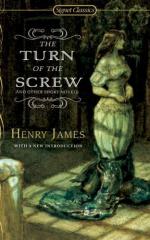|
This section contains 6,472 words (approx. 22 pages at 300 words per page) |

|
SOURCE: “The Ghost of Language in The Turn of the Screw,” in Modern Language Quarterly, Vol. 46, No. 1, March, 1985, pp. 48–63.
In the following essay, Mansell analyzes James's utilization of language in The Turn of the Screw.
1
A word cannot be meaningless; to be a word it must have meaning.1 So-called syncategorematic words (such as “if”) may be a special case. These are said to have no meaning in themselves but only in the context of the sentences in which they figure.2 Demonstratives (“this”), pronouns, and proper nouns (“Napoleon,” “Icarus”) are also special in that the meaning they do have is usually said merely to refer outward to a referent; the referent itself is then the word's actual meaning.3 Other than these cases, to whatever extent they are considered special, words have meanings.
A meaning is an idea. What the idea is of can be considered in either (or indeed...
|
This section contains 6,472 words (approx. 22 pages at 300 words per page) |

|


